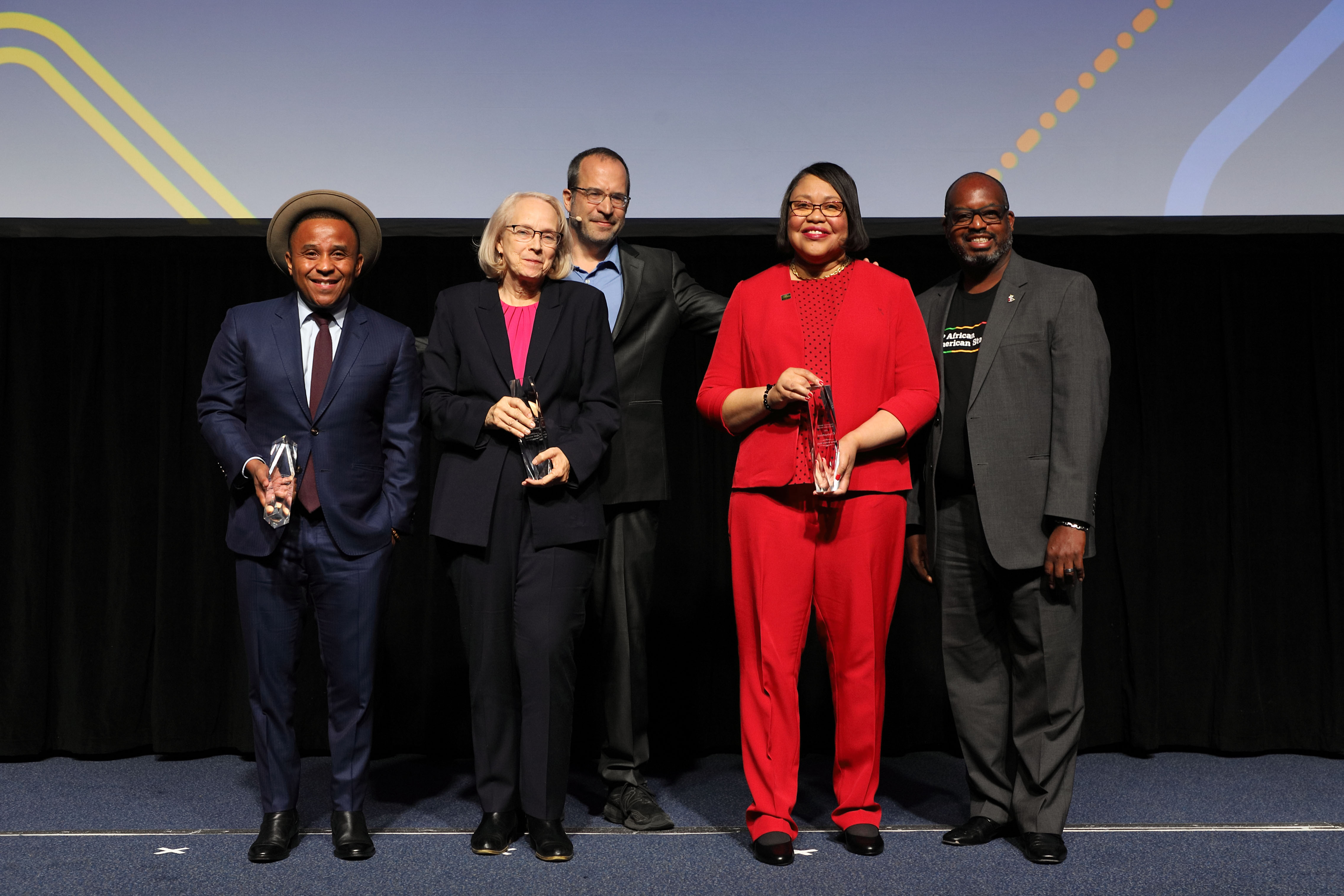College Board Forum 2023
Opening Plenary Session | Meeting the Moment: Where the Invitation Leads
College Board Forum 2023 got off to a rousing start on Wednesday, November 1, with exhortations for members to recall why they entered education and continue to stand for students despite the increasing culture wars surrounding the field.
This is a moment to keep not only the core commitments we made to our students and our communities but also the commitment we made to ourselves when starting in this field.
Tom Moore, Chair, Board of Trustees, College Board
“Ultimately, I want to live up to the idealism of twenty-two-year-old Tom,” Moore said in Wednesday’s opening plenary session of what motivates him each day in his job as Superintendent of Schools for District 219, Niles Township in Illinois.
Moore kicked off College Board Forum, which is the organization’s annual meeting that brings thousands of members together for updates and discussions on new College Board offerings and programs. This year’s annual meeting was held in New York, just blocks from Times Square and Central Park.
Events like Forum, Moore said, provide a critical opportunity to connect with others in the field, to share ideas, and to grow together.
“Use this opportunity to build the friendships that will sustain you and re-energize you for the work ahead,” he said.

Tom Moore, Chair, Board of Trustees, College Board
Moore introduced College Board CEO David Coleman, who shared the lessons learned from the College Board’s “front row seat to the culture wars.”
“Today’s climate of censorship thrusts our Advanced Placement® courses into the fight over what teachers can teach and what students can learn,” Coleman reflected. “We’ve learned that our mistakes matter, and our leadership matters.”
Coleman acknowledged the mistakes made earlier this year in the rollout of a framework for the new AP® African American Studies course and recounted the challenges to that course and AP Psychology from the Florida Department of Education over the summer.
“We learned from our experience with AP African American Studies that we must be clear about where we stand and what we believe,” said Coleman. “So, when Florida asked us to censor AP Psychology or risk having it banned under their new law, we said no—just as we would have said to any state.”
Doing otherwise, Coleman said, would risk the promise of AP: that no matter what school you attend or state you live in, when you take an AP course, you get the “good stuff, the real thing.” That is, challenging, college-level coursework.

David Coleman, Chief Executive Officer, College Board
Three driving imperatives followed those debates, he noted: (1) Be clear about where you stand. (2) Bring along your allies. (3) Defend your choice.
Coleman pledged College Board will not modify any of the 40 AP courses, from African American Studies to art history to science, in response to regulations in any state, district, or school that would remove college-level standards for credit, placement, and career readiness.
We stand for the right of parents and students to choose which courses to take, while we stand against robbing parents and students of their right to take the courses they want.
David Coleman, Chief Executive Officer, College Board
Being clear about those positions, Coleman said, allows the focus to move to other challenges facing education—creating relevant coursework that engages students and helps them prepare for the future and expanding access. Several College Boad programs are already underway to meet the moment.
AP Access Initiatives
- Expanding the project-based AP Seminar course, which enables students to research and share what they are interested in. AP Seminar is now the fastest growing of any AP course of a comparable size. And teachers of that course have achieved the lowest score gap between Black and white students apart from our language courses.
- This fall we are piloting a course in AP Business Principles in which students will make business plans—becoming entrepreneurs designing their own future.
- We are also launching courses in technology infrastructure and technology security as part of our new Career Kickstart program. These courses complement AP Computer Science Principles, which has done so much to open that field to a more diverse body of students.
- By introducing AP Precalculus, we have expanded the opportunities for students to gain credit for math in high school.
But Coleman noted these efforts are not about getting the existing AP students to take more AP courses. “We’re focused instead on the many students who have not taken a single AP course,” he said. “A more relevant course means nothing to a student without access to it.” He called on admissions officers to consider no more than five AP courses in admissions.
SAT Suite
Coleman also shared the success of the SAT Suite to make the test available to more students. Moving SAT administrations into the school day rather than the weekend has meant 67% of students take the SAT in school for free—which has dramatically enhanced the diversity of test takers.
College Board leadership also acknowledged that the move to a digital SAT® Suite has not been without its difficulties. While digital testing has resulted in a shorter, far more relevant test, counselors and test coordinators faced significant challenges with the PSAT/NMSQT® administration this fall, the largest of its kind, testing more than 4 million students with a 99% successful submission rate.
Coleman apologized for the valuable time lost when our tools and processes did not work easily enough. “We have heard your feedback and will continue to listen and improve. Our top priority next year will be to enhance and simplify these tools to save time for educators.”
Higher Ed
While programs like AP and SAT expand access and can help students make their way to postsecondary education, Coleman said College Board remains committed to working with higher education to ensure that SAT results, as well as AP and other achievements, are seen in the context in which students live and learn.
Additionally, College Board investments in the BigFuture® platform, like the BigFuture® School app and Connections™, create opportunities for a far more personalized conversation between students and colleges.
Coleman and Greg Walker, College Board Senior Vice President, State and District Partnerships, closed out the opening plenary session with special College Board awards to members who have shown remarkable courage and impact in the education world. Honored were:
- Ruthie Walls, AP African American Studies Teacher, Central High School, Little Rock, Arkansas
David noted: “Every now and then, you come across a teacher who every student wants to be around, to learn from, to experience. These remarkable teachers change the trajectories of young people’s lives with their commitment and integrity. For students at Little Rock Central High School, that teacher is Ms. Ruthie Walls. And so, it was no surprise that when AP African American Studies came under threat in Arkansas, it was Ruthie who stood up for the course she teaches.” - Dr. Suzanne McCray, Vice Provost for Enrollment and Dean of Admissions, University of Arkansas
“Suzanne raised her voice at a crucial moment.” Coleman remarked in honoring Dr. McCray. The University of Arkansas reaffirmed students would receive college credit for AP African Studies after the Arkansas Department of Education decided the course would not count as credit for graduation. “Everyone knew that the full power of the flagship was behind the course, regardless of what others in the state were saying, and that mattered immensely,” Coleman said. - Rashad Robinson, President, Color of Change
Robinson and his organization, Color of Change, was honored for the true allyship it showed as the Florida Department of Education challenged both AP Psychology and AP African American Studies. “He has thrown himself into efforts to stand up to censorship and preserve academic freedom, using his voice at critical moments on social media, on national TV, on panels around the country to stand up for open and free inquiry in these courses,” Coleman said. “There have been few greater friends and advocates for AP Psychology and AP African American Studies than Rashad and Color of Change.”

Left to right: Rashad Robinson, Dr. Suzanne McCray, David Coleman, Ruthie Walls, Greg Walker